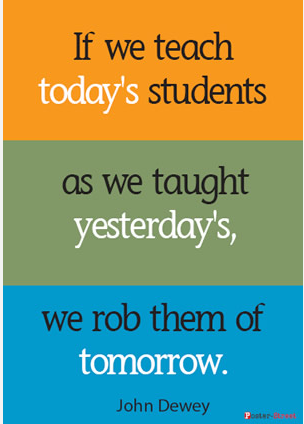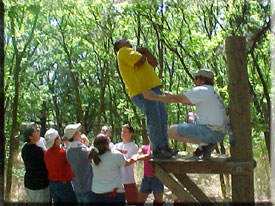 Public education has been overlooking – or worse, neglecting – a golden opportunity to improve. It’s not only been right in front of us all along, it’s been kicking us and taking our lunch money! And yet, somehow, where we should have recognized an opportunity, all we’ve seen is a competitor. In some cases, maybe even a threat.
Public education has been overlooking – or worse, neglecting – a golden opportunity to improve. It’s not only been right in front of us all along, it’s been kicking us and taking our lunch money! And yet, somehow, where we should have recognized an opportunity, all we’ve seen is a competitor. In some cases, maybe even a threat.
It’s like we don’t actually WANT to teach gooder. I assume this is largely due to the various teachers’ unions and Hillary Clinton’s personal email server.
We’ve been told for several decades now that “school choice,” vouchers, educational “savings” accounts, etc., are essential for students to have access to a truly quality education, and that a little healthy competition will make us all better. I, for one, have been guilty of pushing back against this rhetoric. I’ve even been so cynical as to suggest ulterior motives by many of those involved (for which I assure you I now have all sorts of lingering guilt). But as Indiana dramatically expands their various “choice” initiatives and other red states do the same, I believe it’s time to change our approach.
It’s time to seek the guidance of the masters. It’s time to admit our own shortcomings and failures and learn from those who’ve accomplished so much. It’s not selling out, kids – it’s buying in. Besides, there’s nothing for me here now. I want to learn the ways of the Choice and become highly qualified like you. There’s still good in me. Surely you can sense it.
Teach us.
Learning The Ways Of The Choice
The primary argument for “school choice” is that the quality of the education is just plain better. The teachers are better. The administration is better. The system is organized more efficiently. The curriculum is more coherent and whole. The atmosphere simply reeks of excellence.
It’s easy to lose sight of this because those of us on the pro-“destroying the future” side of things have been too long distracted by this crazy idea that private schools achieve their goals primarily by picking and choosing which students they want on their rosters and turning away the rest. We’ve quibbled over many institutions’ focus on religious dogma, questionable science, distorted or overly selective history, and a tendency to blame everything from poverty to skin tone on some combination of personal failure and the sins of Cain. We’ve let ourselves become overly focused on the relative lack of improvement demonstrated year after year in “educational outputs” instead of zeroing in on the handful of truly impressive outliers here and there who get cited in all the brochures.
In short, we’ve been too cynical. Let’s try assuming the best about our cohorts in the world of private religious schooling, shall we?
I’m Here To Rescue You
If it’s about better teaching, then please – come train us. Show us your ways. It has to be better than most of the “professional development” to which we’re usually subjected. I’ll even pay attention and do the activities – I promise!
If it’s about better school administration, then come run a building or two for us. The pay has to be better, and if there’s such a thing as “doing the Lord’s work,” then surely this qualifies. Come show us how to reduce waste and establish that culture of excellence or whatever. We even promise not to pull the “union won’t let you” card out for the first year or two.
If it’s about better policies, then that’s easy. Just email us a PDF and we’ll gladly give it a go. Anything conflicting with state requirements should be simple enough to fix. If all of these legislators are as committed to educational excellence as they keep insisting (particularly when it involves more “freedom” and greater “choice”), surely they’d be willing to waive a statute or two. Or 3,497.
If it’s about curriculum, we’ll gladly pay for a copy. We’re apparently flush with wasted cash here in the world of public education. It would no doubt be an improvement, I assure you. Our administration buys some weird stuff already and your standards can’t be any worse than “Teach Like A Mongol Barbarian” or “Writing Through Excellence In Compassionate Modal Communication Across The Curriculum For Everyone!”
If it’s about facilities, well… I guess that depends on what we’re missing. Apparently we waste all kinds of resources on overstaffing and glossy copy paper and what not – maybe cutting back a little on the bad stuff would free up some funds. If not, there’s always another fundraiser pushing overpriced M&Ms on kids. Or Kickstarter.
In short, we’re ready. Come show us how to teach our students as effectively as you teach yours. Come show us how to be more committed, less wasteful, and become overall better people both personally and professionally. You win. We’re mediocre and whiney. You’re talented and full of passion. Help us, Obi-Wan Kenobi – you’re our only hope.
The Terminally Exhausted Part
There is one tiny little downside to this plan: it will never happen. And even if it did, it would never work.
Maybe that’s two tiny little downsides.
The problem isn’t that private school teachers aren’t any good at what they do. Many of them are amazing. The problem is that so are many public school educators. Despite rhetoric to the contrary, that’s not really the issue. Nor is it about curriculum or facilities or administration.
When private schools have superior outcomes, you’ll generally find they started with very different students than the public school they’re supposed to be “inspiring” down the road. That’s not even necessarily a bad thing. The best and brightest need good teachers just like everyone else. They’re not always easier to teach or intrinsically motivated to learn. As any teacher of advanced students (public or private) can assure you, “top” kids are just as much work as “bottom” kids – just in different ways.
But let’s stop pretending it’s an accomplishment to inherit upper middle class white kids from two-parent families whose lives have been full of travel and books and engaging conversation and art and expectations and consistency. Let’s stop pretending that’s somehow not one of the biggest draws of private schooling – the chance to have your elite little darling surrounded by and shaped by other folks’ elite darlings. We see it in AP or IB classes in public schools. We see it in neighborhoods in different parts of town. We see it in the churches we choose to attend and the stores in which we choose to shop. We can debate whether it’s ethically “right” or “wrong,” but only if we start by being honest about this very human tendency we’re indulging.
Let’s stop pretending that “choice” is about improving “educational outcomes” for everyone. Sure, that fits a certain school of capitalistic thought – but after decades of spouting the admittedly catchy rhetoric that goes along with it, it turns out it simply doesn’t work in any sort of predictable or consistent way. The vast majority of the time, “school choice” is about getting US away from THEM, whether the distinction is racial, economic, or religious. (That’s also why it’s usually the schools that have their choice of students; not students who have a true choice of schools.) Personally, I think it undercuts one of the primary functions of public education if we allow large segments of the community to pull their children into little enclaves and teach them stuff that runs against the goals and success of the larger society. But we can’t even have that argument unless we start being honest with each other (and ourselves) about what we want and why we make the choices we do.
The X-Files Problem
One of the most frustrating premises of the classic “X-Files” series was that not only was the truth “out there,” but there were numerous individuals fully aware of it who simply wouldn’t tell the rest of us. Scully and Muldar were working not only against aliens, freaks, and the elusive nature of reality – they were being taunted by their own government who could have saved all sorts of time and money if they’d simply sent them a few PDF summaries of how things really worked.
It’s foolish to pretend that the secret to education is out there – the unified learning theory that reaches all students in all situations and imparts all the knowledge and skills we’d like if only we were willing to push the “GO” button. There are good ideas and bad, stuff that works in many situations with many different types of kids and stuff that’s pretty stupid no matter where it’s tried. There are teachers working wonders in impossible situations and entire districts coasting along mired in mediocrity and bureaucracy. And yes, there are private schools doing a much better job with challenging populations than their public counterpart down the street.
There are legit arguments to be had about “school choice” when it comes to private schools willing to teach a largely secular curriculum to students very much like those attending the local public schools and take responsibility for both the results and how they treat their students in order to make it happen. We pretend we’re having them all the time.
Usually we’re not.
If “school choice” is of genuine benefit to all students, it should be easy to both document and replicate – neither of which seems to be happening much. If it’s not, the conversation should be about whether or not there are other good reasons to keep doing it. We can’t have that discussion, however, until all parties are willing to get a little more honest with themselves about what they’re actually doing and why they’re doing it.
RELATED POST: 5 Bad Assumptions Behind Education Reform
RELATED POST: Welcome To Atheist School!
RELATED POST: To Sleep, Perchance To Sue…


 It doesn’t help that last year didn’t go as well as I’d hoped. I moved to a new district in a new state to teach a new subject in a whole new reality stream. I love the new district, and the kids, and even the town. If only I’d not, you know… sucked so badly.
It doesn’t help that last year didn’t go as well as I’d hoped. I moved to a new district in a new state to teach a new subject in a whole new reality stream. I love the new district, and the kids, and even the town. If only I’d not, you know… sucked so badly. Even when we’re in the middle of it, I’m not sure intuition and guesswork don’t play just a big of a role as knowledge and preparation. We can work mighty hard and it still seem like some of the best moments are a function of weird luck as much as anything.
Even when we’re in the middle of it, I’m not sure intuition and guesswork don’t play just a big of a role as knowledge and preparation. We can work mighty hard and it still seem like some of the best moments are a function of weird luck as much as anything.
 Anyone in the world of public education for any length of time knows that we have a tendency to oversimplify things which are more complicated than we care to admit and to complicate things which simply don’t have to be that difficult.
Anyone in the world of public education for any length of time knows that we have a tendency to oversimplify things which are more complicated than we care to admit and to complicate things which simply don’t have to be that difficult. Terrorism is a fun topic that can’t help but enliven any social event. Let’s take a hypothetical nation with a corrupt or marginalized government, high poverty, and limited opportunity, which becomes a “breeding ground” (here’s to loaded language) for terrorism. We’ll call it Scarykillastan.
Terrorism is a fun topic that can’t help but enliven any social event. Let’s take a hypothetical nation with a corrupt or marginalized government, high poverty, and limited opportunity, which becomes a “breeding ground” (here’s to loaded language) for terrorism. We’ll call it Scarykillastan. I’m not mocking anyone. It genuinely feels backwards. Some of you will be angry even reading it as a hypothetical example. I’m also not sure things actually work out quite so efficiently in real life, although with this particular example I’ve heard some good arguments that they could. But many of us would argue against the hippie solution even if it repeatedly and demonstrably worked better – for less money, at the cost of fewer lives, and possibly even improving our moral standing in the world.
I’m not mocking anyone. It genuinely feels backwards. Some of you will be angry even reading it as a hypothetical example. I’m also not sure things actually work out quite so efficiently in real life, although with this particular example I’ve heard some good arguments that they could. But many of us would argue against the hippie solution even if it repeatedly and demonstrably worked better – for less money, at the cost of fewer lives, and possibly even improving our moral standing in the world. What if it could be demonstrated with great certainty that spending more on social services, education, health care, etc., leads to lower crime, higher graduation rates, and over time saves millions of local dollars? What if it could be established that taking better care of society’s most marginalized elements pays off in both human and fiscal terms? Just to stretch our hypothetical, let’s throw in some extra care for women, sex ed in every high school, and maybe some affirmative action, and have it all result in better neighborhoods, higher productivity, fewer unwanted pregnancies and STDs, and a reliable surplus in the state coffers. Would we do it?
What if it could be demonstrated with great certainty that spending more on social services, education, health care, etc., leads to lower crime, higher graduation rates, and over time saves millions of local dollars? What if it could be established that taking better care of society’s most marginalized elements pays off in both human and fiscal terms? Just to stretch our hypothetical, let’s throw in some extra care for women, sex ed in every high school, and maybe some affirmative action, and have it all result in better neighborhoods, higher productivity, fewer unwanted pregnancies and STDs, and a reliable surplus in the state coffers. Would we do it? What if eliminating grades could be shown to dramatically improve student learning? What if eliminating detentions and suspensions could be shown to drastically reduce discipline problems (not just acknowledgment of those problems, but the actual problems)? What if taking more radical steps towards cultural equity and social justice didn’t create chaos and rolling eyes over talk of safe spaces and microaggressions, but could be repeatedly and objectively shown to improve behavior, and learning, and future success in life, and whatever else we think is important?
What if eliminating grades could be shown to dramatically improve student learning? What if eliminating detentions and suspensions could be shown to drastically reduce discipline problems (not just acknowledgment of those problems, but the actual problems)? What if taking more radical steps towards cultural equity and social justice didn’t create chaos and rolling eyes over talk of safe spaces and microaggressions, but could be repeatedly and objectively shown to improve behavior, and learning, and future success in life, and whatever else we think is important? Because, seriously, CAN’T THOSE PEOPLE JUST GET THEIR %#(# TOGETHER AND THEN WE WON’T HAVE A PROBLEM ANYMORE AND WON’T HAVE TO KEEP BRINGING UP ALL THIS STUPID NEW-AGE INANITY?!? Or, more calmly, “Forget the results – can’t they just GET there the WAY we want them to?!”
Because, seriously, CAN’T THOSE PEOPLE JUST GET THEIR %#(# TOGETHER AND THEN WE WON’T HAVE A PROBLEM ANYMORE AND WON’T HAVE TO KEEP BRINGING UP ALL THIS STUPID NEW-AGE INANITY?!? Or, more calmly, “Forget the results – can’t they just GET there the WAY we want them to?!” It’s funny the things that make us uncomfortable.
It’s funny the things that make us uncomfortable. In the midst of the chaos, we’ve introduced “World History” and what it means to add “AP” to the beginning. I’ve crammed in a few lectures, some jigsaw reading, a pretty big discussion about foundational themes – all while trying to get to know my kids enough to be effective in a new subject in a new place in a new reality stream.
In the midst of the chaos, we’ve introduced “World History” and what it means to add “AP” to the beginning. I’ve crammed in a few lectures, some jigsaw reading, a pretty big discussion about foundational themes – all while trying to get to know my kids enough to be effective in a new subject in a new place in a new reality stream. My ears eventually picked up the subtle scribbling of little mechanical pencils, and the periodic turning of pages. After what must have been seventeen or eighteen hours, a young lady leaned over to her tablemate and pointed to something in the text, whispering an apparent inquiry. Her cohort considered whatever she’d said, then nodded and gave a brief response which seemed to satisfy her. They both then continued doing this… this… horrifying “old way” schoolness.
My ears eventually picked up the subtle scribbling of little mechanical pencils, and the periodic turning of pages. After what must have been seventeen or eighteen hours, a young lady leaned over to her tablemate and pointed to something in the text, whispering an apparent inquiry. Her cohort considered whatever she’d said, then nodded and gave a brief response which seemed to satisfy her. They both then continued doing this… this… horrifying “old way” schoolness. If you’ve taught for any length of time, you’ve endured endless PD days, videos, handouts, faculty presentations, and perhaps even a horrible skit or two, built around three basic assumptions: (a) all teachers used to suck in every possible way, providing endless “before” examples, (b) most current teachers have no idea how to work with young people and probably don’t even like them very much, usually because of our cultural insensitivity, and (c) if we don’t embrace {insert trendy strategy here}, we’ll continue to suck and most likely destroy the future.
If you’ve taught for any length of time, you’ve endured endless PD days, videos, handouts, faculty presentations, and perhaps even a horrible skit or two, built around three basic assumptions: (a) all teachers used to suck in every possible way, providing endless “before” examples, (b) most current teachers have no idea how to work with young people and probably don’t even like them very much, usually because of our cultural insensitivity, and (c) if we don’t embrace {insert trendy strategy here}, we’ll continue to suck and most likely destroy the future. So I’d like to assure all of the baby teachers out there, and remind some of the veterans, that all instructional and classroom management advice – the pedagogy, the brain research, the anecdotes, the activities – are (or should be) about giving you ideas. Options. Tools. Challenging you, or inspiring you. Maybe shaking you up or forcing you to question how you do things from time to time.
So I’d like to assure all of the baby teachers out there, and remind some of the veterans, that all instructional and classroom management advice – the pedagogy, the brain research, the anecdotes, the activities – are (or should be) about giving you ideas. Options. Tools. Challenging you, or inspiring you. Maybe shaking you up or forcing you to question how you do things from time to time. Question your methods, absolutely. Challenge your perceived results. Be transparent with your co-workers in considering ways to be more effective. Don’t be insecure and stuck in the mythical, dark “ancient ways.”
Question your methods, absolutely. Challenge your perceived results. Be transparent with your co-workers in considering ways to be more effective. Don’t be insecure and stuck in the mythical, dark “ancient ways.”
 I’m a bad person.
I’m a bad person. Don’t get me wrong – it’s just peachy keen swell that throwing a few computers in the middle of an impoverished village and making sure no teachers interfere practically guarantees a bunch of eight-year olds will master calculus, cure cancer, and reverse climate change. Here’s to the success of every one of those dusty darlings and even newer, bigger opportunities for them to challenge themselves AND the dominant paradigm. Seriously.
Don’t get me wrong – it’s just peachy keen swell that throwing a few computers in the middle of an impoverished village and making sure no teachers interfere practically guarantees a bunch of eight-year olds will master calculus, cure cancer, and reverse climate change. Here’s to the success of every one of those dusty darlings and even newer, bigger opportunities for them to challenge themselves AND the dominant paradigm. Seriously. Maybe it would be better to do the entire building… eleven hundred freshmen set free to learn with a bank of Dells and no silly adults with their stifling expectations. Imagine the money saved on staff – and computers never take personal days or violate professional dress code!
Maybe it would be better to do the entire building… eleven hundred freshmen set free to learn with a bank of Dells and no silly adults with their stifling expectations. Imagine the money saved on staff – and computers never take personal days or violate professional dress code! I’m not unsympathetic. I get what these writers and speakers are going for. Most are trying to make the very valid point that when we try to cram kids’ heads full of 87-pages of curriculum standards compiled by committees and approved by states to be tested by bubbles, we are unlikely to either fill their buckets OR light their fires.
I’m not unsympathetic. I get what these writers and speakers are going for. Most are trying to make the very valid point that when we try to cram kids’ heads full of 87-pages of curriculum standards compiled by committees and approved by states to be tested by bubbles, we are unlikely to either fill their buckets OR light their fires. It’s not. Remember that Oregon Trail game we were all so excited about a few decades ago? That’s still about as cutting edge as educational games have managed, and that’s not even what most virtual learning is attempting.
It’s not. Remember that Oregon Trail game we were all so excited about a few decades ago? That’s still about as cutting edge as educational games have managed, and that’s not even what most virtual learning is attempting.  There are glaring problems with this system, some within the school’s control and many more without. The biggest problem with the current model is also the most substantial barrier to all this self-directed learning we keep hearing will save us all – state legislatures dictate most of what’s supposed to be “important” and decide how these things will be assessed.
There are glaring problems with this system, some within the school’s control and many more without. The biggest problem with the current model is also the most substantial barrier to all this self-directed learning we keep hearing will save us all – state legislatures dictate most of what’s supposed to be “important” and decide how these things will be assessed.